|
| Seminars |
-

Seminars held by Centre for Chinese Family Studies
-

Seminars held by Centre for Social Innovation Studies
-

Seminar held by Centre for Youth Studies
-

Seminar held by Gender Research Centre
-

Seminar held by Research Centre for Urban and Regional Development
-

Seminars held by Policy Research@HKIAPS
|
|
|
|
Speaker
Prof. Jing Song
|
Gender Studies Programme, CUHK
|
|
Co-organizers
Department of Sociology, CUHK
Gender Studies Programme, CUHK
|
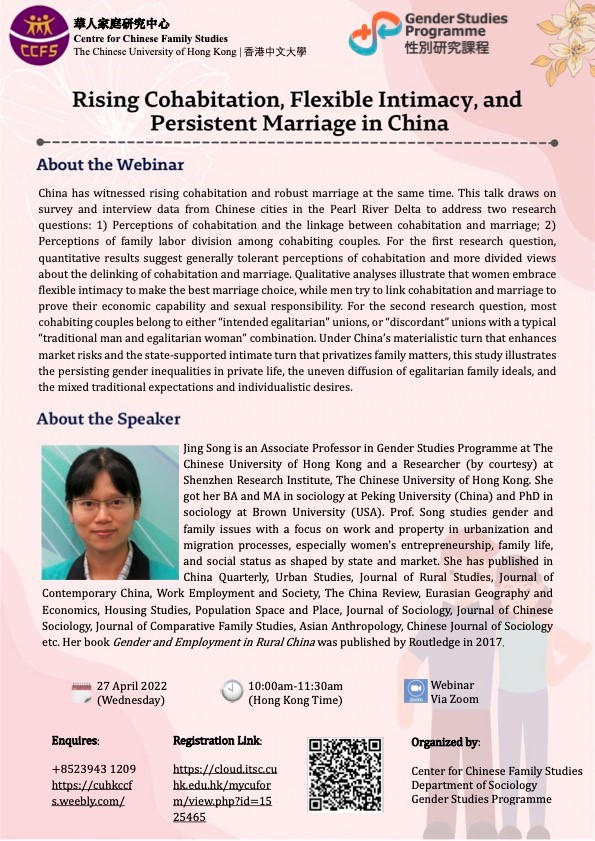
China has witnessed rising cohabitation and robust marriage at the same time.
This talk draws on survey and interview data collected from Chinese cities in the Pearl River Delta to address two research questions:
1) perceptions of cohabitation and the linkage between cohabitation and marriage;
2) perceptions of family labour division among cohabiting couples.
For the first research question,
quantitative results suggest generally tolerant perceptions of cohabitation and more divided views about the delinking of cohabitation and marriage.
Qualitative analysis illustrates that women embrace flexible intimacy to make the best marriage choice,
while men try to link cohabitation and marriage to prove their economic capability and sexual responsibility.
For the second research question,
most cohabiting couples belong to either “intended egalitarian” unions, or “discordant” unions with a typical “traditional man and egalitarian woman” combination.
Under China’s materialistic turn,
which enhances market risk, and the state-supported intimate turn,
that privatizes family matters, this study illustrates the persisting gender inequalities in private life,
the uneven diffusion of egalitarian family ideals, and the mixture of traditional expectations and individualistic desires.
|
|
|
|
|
|
Speaker
Prof. Yingyi Ma
|
Associate Professor, Sociology Department, Syracuse University, United States
|
|
Co-organizer
Department of Sociology, CUHK
|
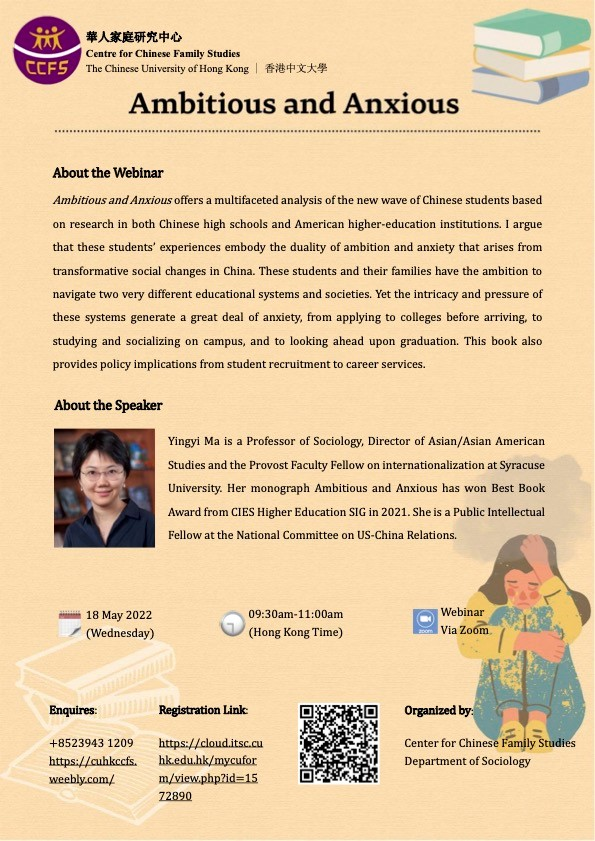
Ambitious and Anxious offers a multifaceted analysis of the new wave of Chinese students based on research
in both Chinese high schools and American higher-education institutions.
The speaker argues that these students’ experiences embody the duality of ambition and anxiety that arises from transformative social change in China.
These students and their families have the ambition to navigate two very different educational systems and societies.
Yet the intricacy and pressure of these systems generate a great deal of anxiety,
from applying to colleges before arriving,
studying and socializing on campus, to looking ahead upon graduation.
This webinar also provides policy implications from student recruitment to career services.
|
|
|
|
|
|
Speaker
Prof. Ling Zhu
|
Assistant Professor, Department of Sociology, CUHK
|
Co-organizer
Department of Sociology, CUHK
|
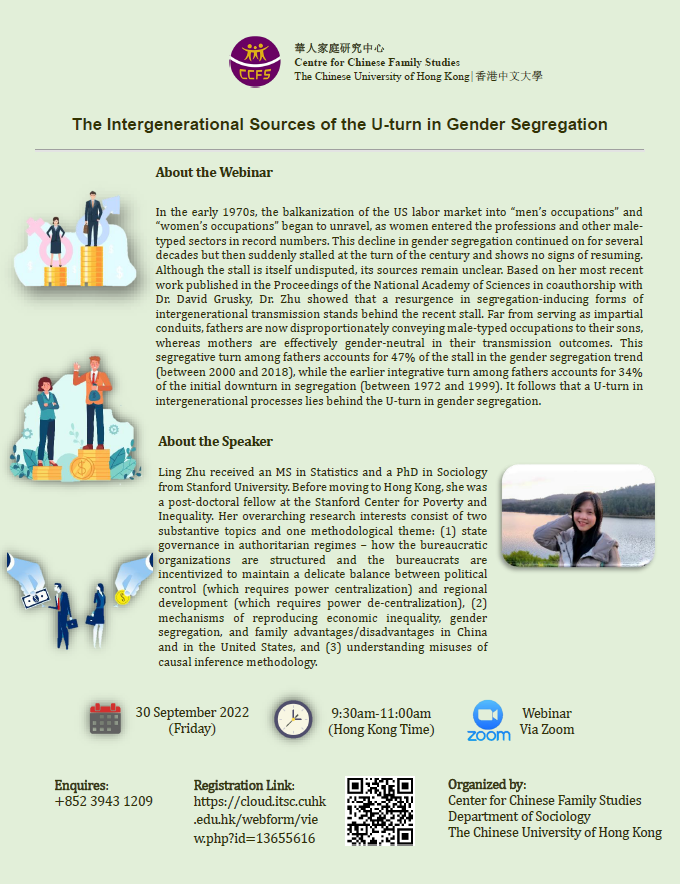
In the early 1970s, the balkanization of the US labor market into “men’s occupations” and “women’s occupations” began to unravel,
as women entered the professions and other male-typed sectors in record numbers.
This decline in gender segregation continued on for several decades but then suddenly stalled at the turn of the century and shows no signs of resuming.
Although the stall is itself undisputed, its sources remain unclear.
Based on her most recent work published in the Proceedings of the National Academy of Sciences in coauthorship with Dr David Grusky,
Prof. Zhu showed that a resurgence in segregation-inducing forms of intergenerational transmission stands behind the recent stall.
Far from serving as impartial conduits, fathers are now disproportionately conveying male-typed occupations to their sons,
whereas mothers are effectively gender-neutral in their transmission outcomes.
This segregative turn among fathers accounts for 47% of the stall in the gender segregation trend (between 2000 and 2018),
while the earlier integrative turn among fathers accounts for 34% of the initial downturn in segregation (between 1972 and 1999).
It follows that a U-turn in intergenerational processes lies behind the U-turn in gender segregation.
|
|
|
|
|
|
|
Speaker
Ms Man-chi Ho
|
Project Manager, The Mushroom Initiative
|
|
Moderators
Miss Teresa Chan
|
Reseach Assistant, CSIS
|
|
Mr Mars Ho
|
Reseach Assistant, CSIS
|
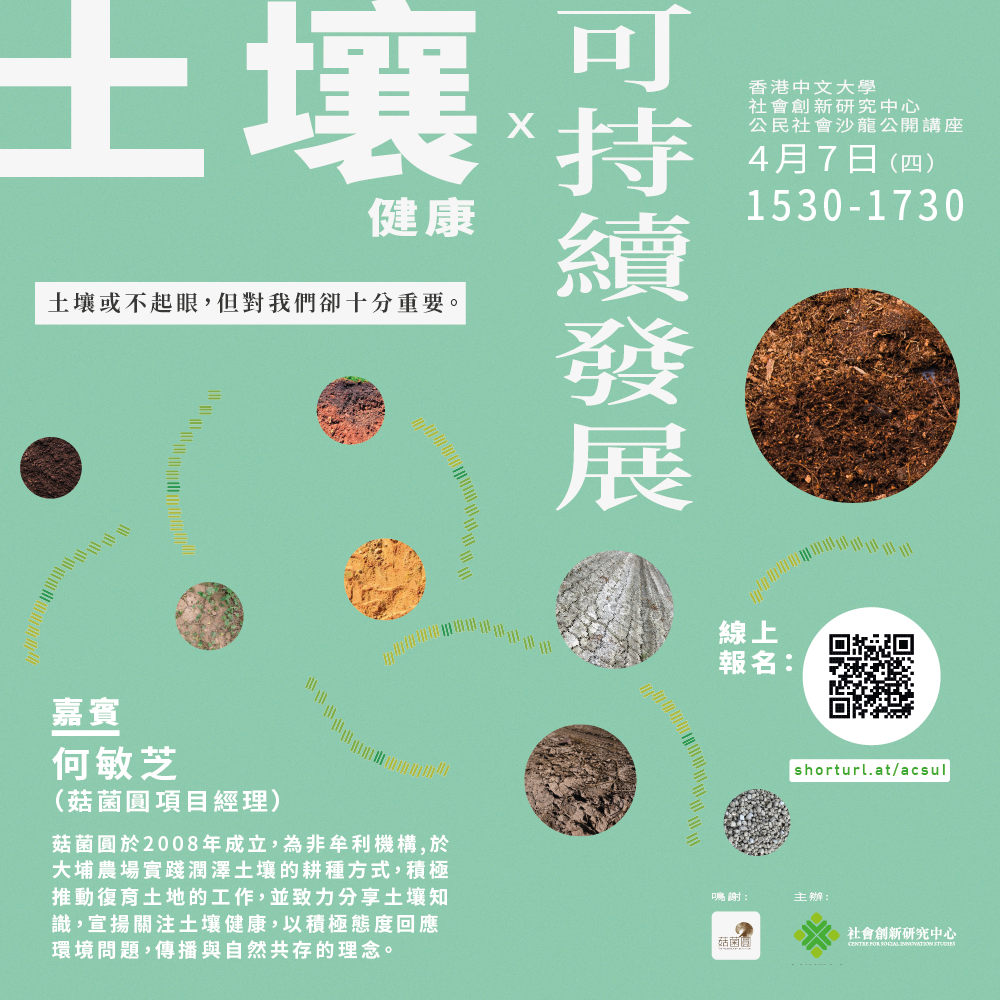
The United Nations Food and Agriculture Organization is actively drawing attention to soil health and agricultural land conservation in response to the global warming crisis highlighted at the 2015 Paris Climate Summit.
We invited a local organization “The Mushroom Initiative” to explain the crisis of land degradation in Hong Kong.
The speaker explained the soil crisis from a scientific angle and shared solutions on soil restoration.
|
|
|
|
|
|
Speaker
Dr Joseph Cho
|
Member, Executive Committee, CSIS
|
|
Moderators
Miss Teresa Chan
|
Reseach Assistant, CSIS
|
|
Mr Mars Ho
|
Reseach Assistant, CSIS
|
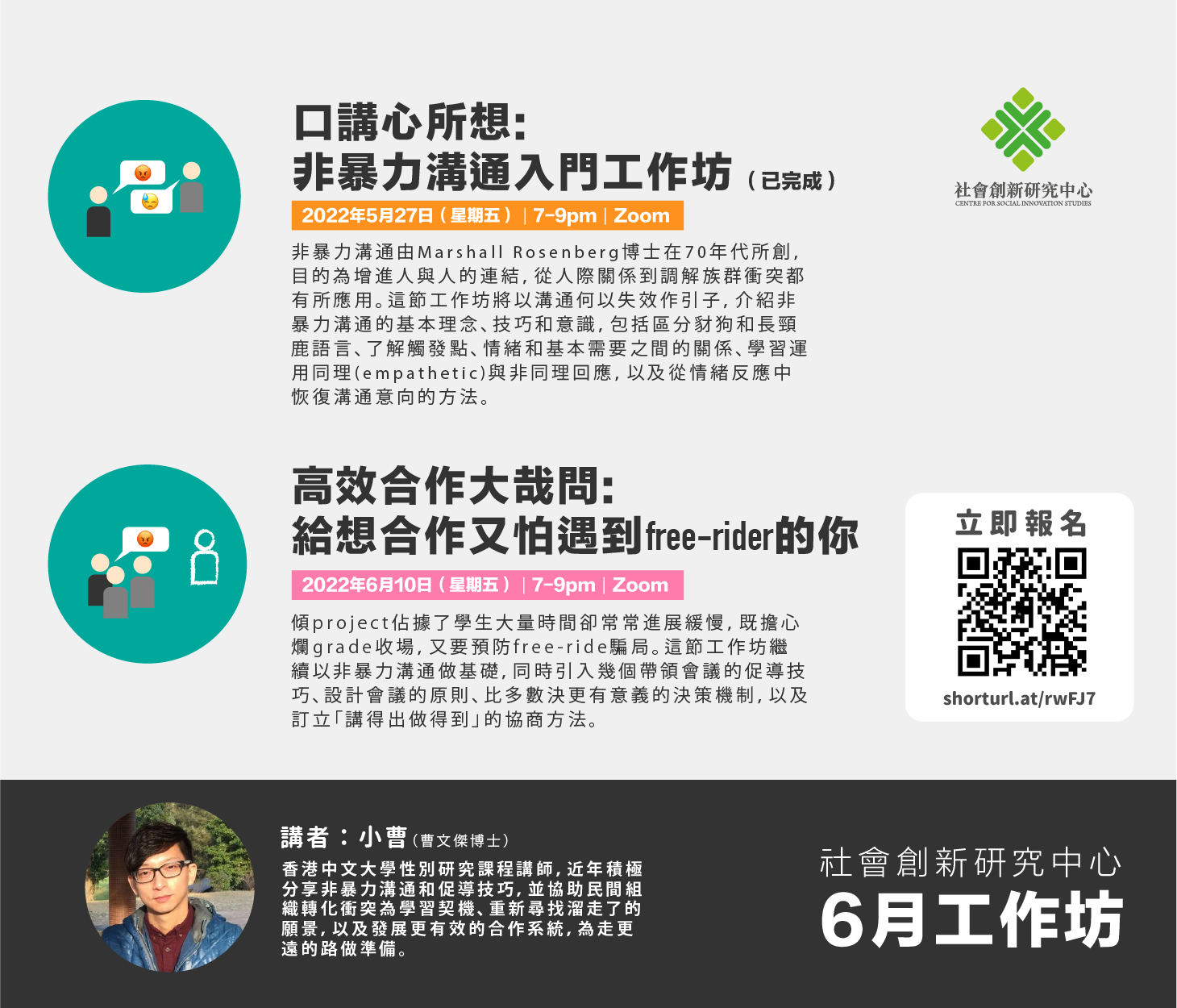
Non-violent communication (NVC) was developed by Dr. Marshall Rosenberg in the 1970s with an aim to strengthen connections between people.
From interpersonal communications to resolving ethnic conflict, NVC can be applied to a wide range of scenarios.
The workshop introduced the basic concepts, skills and core values of non-violent communication,
which covers differentiating between jackal and giraffe languages, understanding the relationship between trigger points,
emotions and basic needs, learning to handle empathetic and non-empathetic responses,
and ways to recover communication intention from emotional responses.
|
|
|
|
|
|
Speaker
Dr Joseph Cho
|
Member, Executive Committee, CSIS
|
|
Moderators
Miss Teresa Chan
|
Reseach Assistant, CSIS
|
|
Mr Mars Ho
|
Reseach Assistant, CSIS
|
|
Students often find difficulties in group projects, which take a lot of time and effort, while facing free-rider problems.
This workshop continued the workshop of Non-violent Communication (NVC) skills.
We introduced several facilitation techniques in holding meetings,
decision-making mechanisms, and the “tell-it-as-it-is” negotiation approach.
|
|
|
|
|
|
Speakers
Ms Amanda Feldman
|
Co-Founder, Heliotropy
|
|
Mr Warren Luk
|
CEO, Good Lab
|
|
Moderator
Prof. Anthony Y. H. Fung
|
Director, HKIAPS
|
|
In collaboration with Oxford University’s Skoll Centre for Social Entrepreneurship,
an online course was delivered to help first-time jobseekers delve deeper into the world of social innovation.
Social innovators and entrepreneurs walked through the 5W1H of social innovation:
WHAT it is, WHY it is important, WHO social innovators are, WHERE it can happen, and HOW you can be part of the change.
|
|
|
|
|
|
Session 1: Presentations
Ms Dora Li
|
General Manager, Investor and Financial Education Council
|
|
Mr Ricky Chu, I.D.S.
|
Chairperson, Equal Opportunites Commission
|
|
Prof. Lynne Nakako
|
Co-Director, GRC, HKIAPS
|
|
Prof. Christina W. M. Yu
|
Professor (Practice), Department of Social Sciences,
The Education University of Hong Kong
|
|
Session 2: Panel Discussion
Ms Si-si P. S. Liu
|
Director, Hong Kong Federation of Women’s Centres
|
|
Ms Stephanie K. Y. So
|
Unit in Charge, Women Affairs Department,
Hong Kong Young Women’s Christian Association
|
|
Mr Bradley Aaron
|
Executive Director, EmpowerU
|
|
Ms Sumi Gurung
|
Programme Manager, EmpowerU
|
|
Mr Alex See
|
Director of Fundraising, Pink Alliance
|
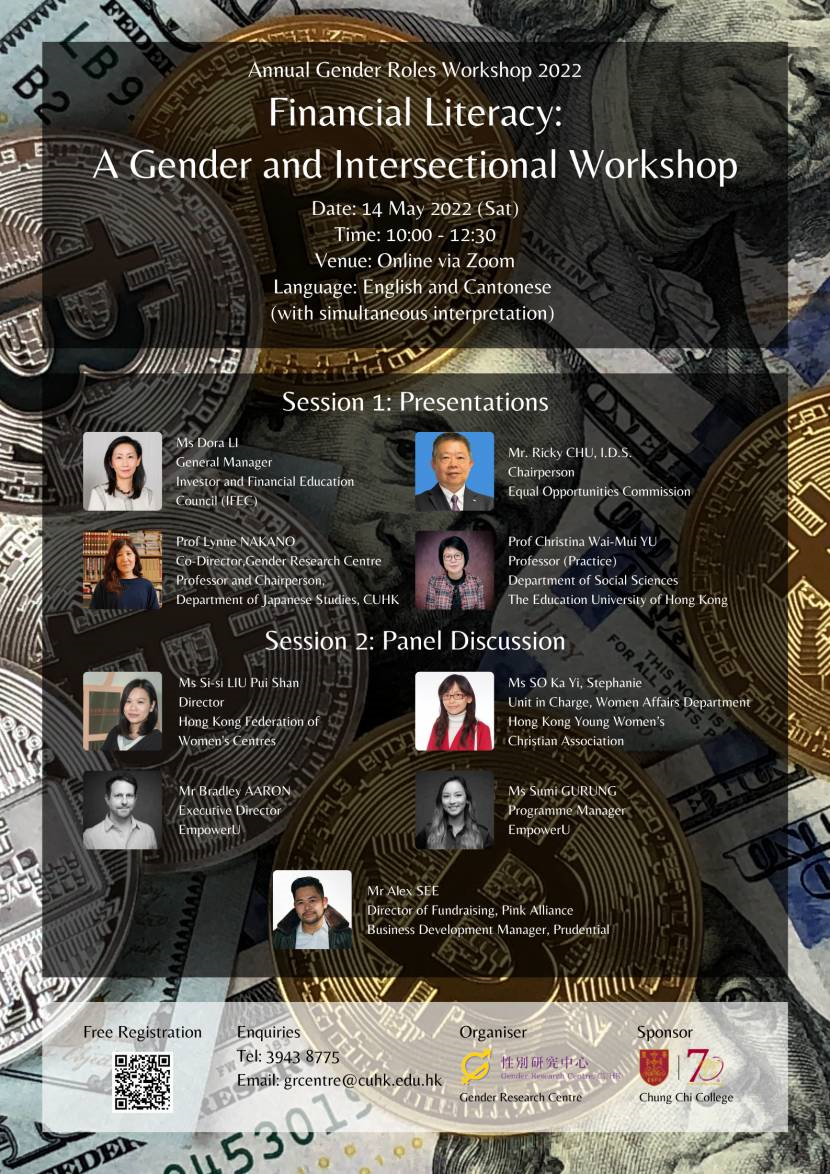
Financial literacy allows us to make well-considered financial decisions that shape our financial security,
personal well-being, the well-being of our loved ones, and the ability to live our lives according to our values.
In Hong Kong, a global financial centre, some segments of the population,
such as some women and minority groups,
have limited access to financial knowledge -
knowledge that would help them make financial decisions to support their financial independence and achievement of life goals.
“Financial Literacy: A Gender and Intersectional Workshop” seeks to facilitate discussion among policymakers,
academics, and NGOs on the approaches to financial literacy education for different disadvantaged groups in the city.
|
|
|
|
|
|
Speaker
Dr Federico Cugurullo
|
Assistant Professor in Smart and Sustainable Urbanism,
Geography Department, Trinity College Dublin, Ireland
|
|
Co-organizer
Department of Geography and Resource Management, CUHK
|
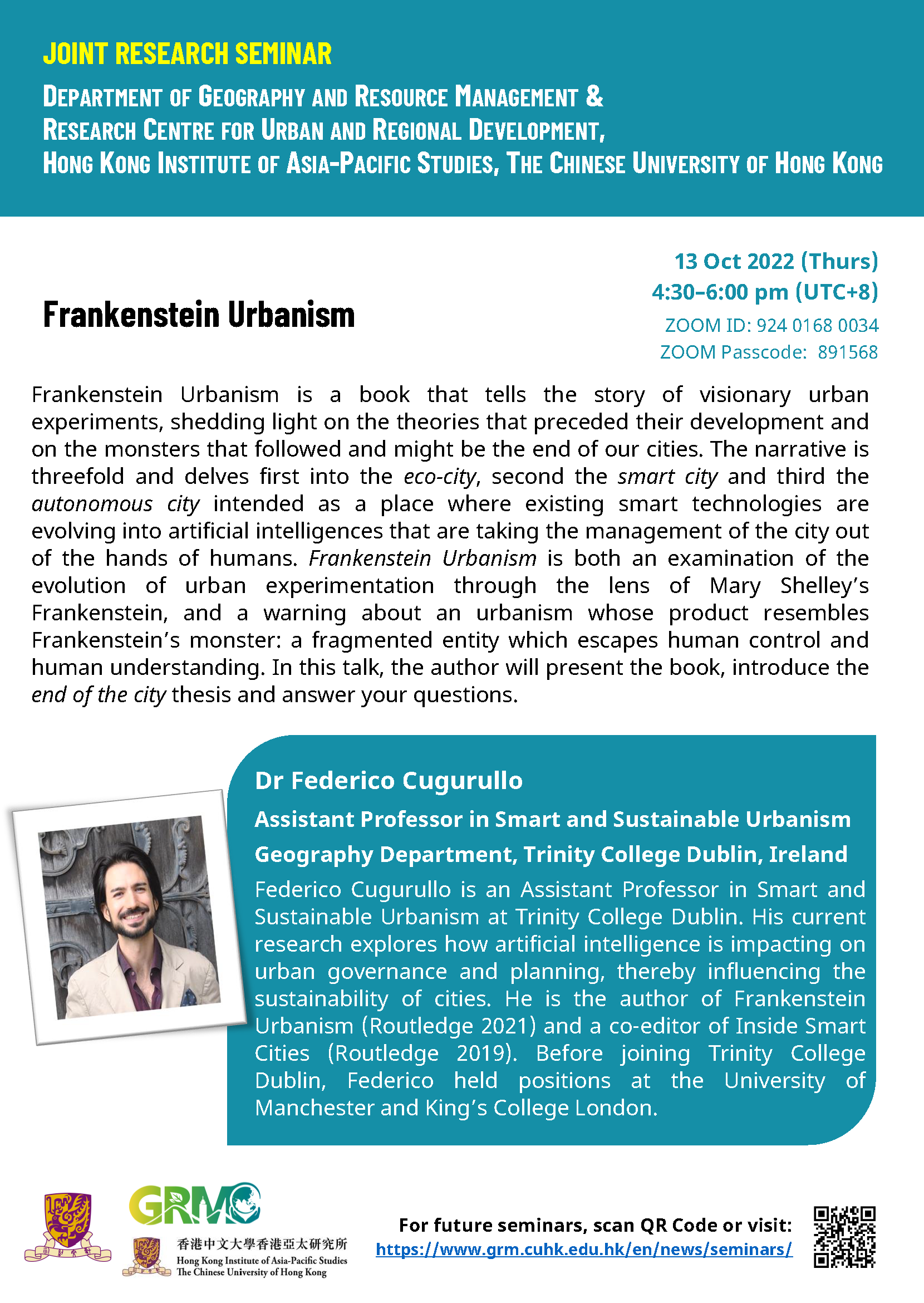
Frankenstein Urbanism is a book that tells the story of visionary urban experiments,
shedding light on the theories that preceded their development and on the monsters that followed and might be the end of our cities.
The narrative is threefold and delves first into the eco-city,
second the smart city and third the autonomous city,
intended as a place where existing smart technologies evolve into artificial intelligences that take the management of the city out of the hands of humans.
Frankenstein Urbanism is both an examination of the evolution of urban experimentation through the lens of Mary Shelley’s Frankenstein,
and a warning about an urbanism whose product resembles Frankenstein’s monster: A fragmented entity which escapes human control and human understanding.
In this talk, the author presented the book,
introduce the end of the city thesis and answered audience’s questions.
|
|
|
|
|
|
Speaker
Prof. Dongshu Ou
|
Associate Professor, Department of Educational Administration and Policy, CUHK
|
|
Discussants
Prof. Stephen W. K. Chiu
|
Chair Professor of Sociology, Department of Social Sciences, The Education University of Hong Kong
|
|
Prof. Chen Li
|
Associate Professor, Centre for China Studies, CUHK
|
|
Moderator
Prof. Fanny M. Cheung
|
Senior Advisor, Faculty of Social Science & HKIAPS, CUHK
|
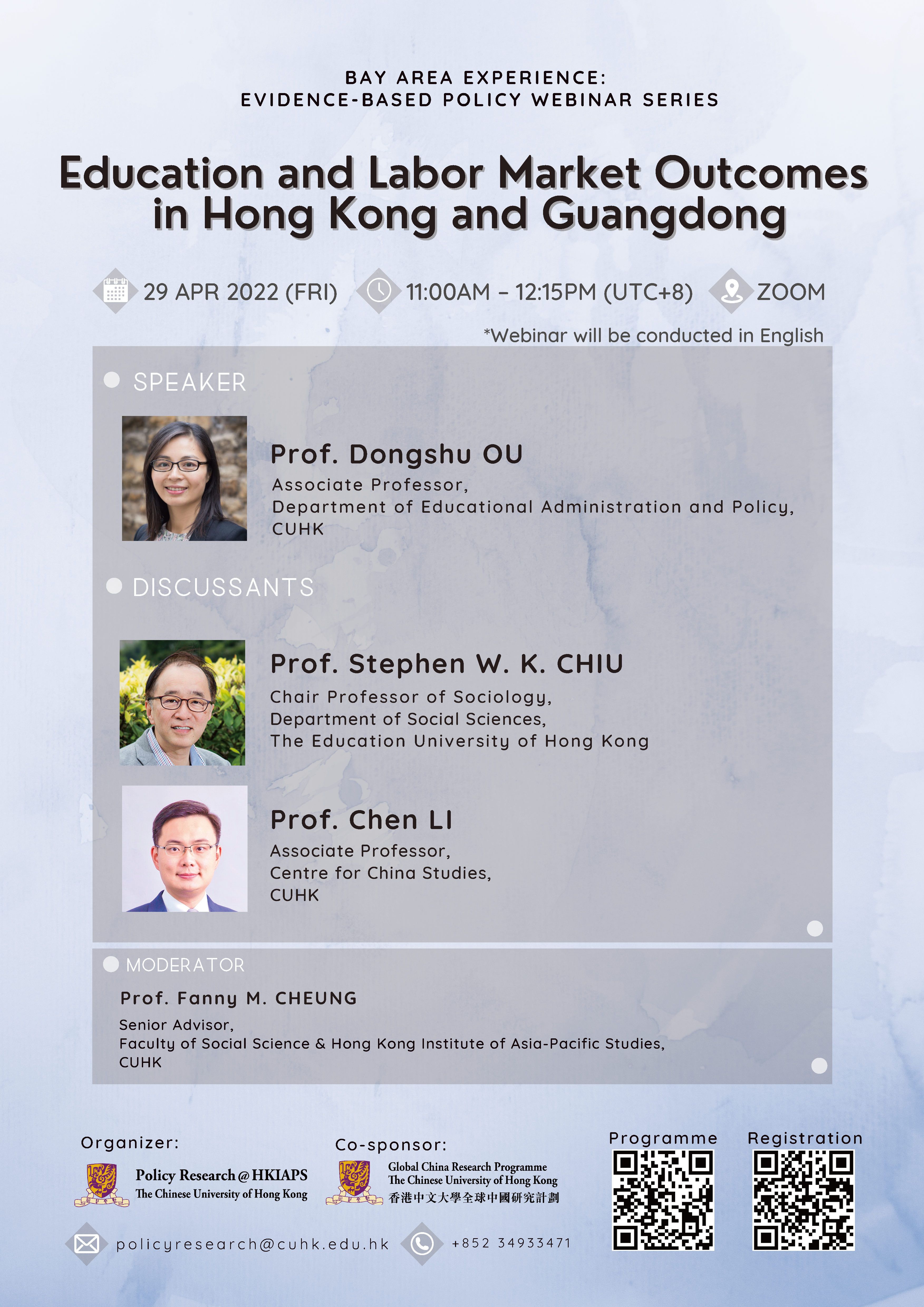
In Prof. Ou’s study, educational mismatch is defined as the difference between the level of education that an individual has attained and the level of skill required for a specific job.
The difference represents a manifestation of undereducation or overeducation,
which means that there is inefficiency in the use of public resources in society.
An educational mismatch will lead to lower job satisfaction and higher job turnover.
The research team used the realized matches (RM) method to measure incidences of educational mismatch,
and compared natives and immigrants in Hong Kong and Guangdong province in relation to overeducation and undereducation.
The results were compared with findings from cities worldwide.
The RM method uses the distribution of the education levels of workers in each occupation to infer the level of education required for that job.
This analysis uses the mean or mode of the education level of the labour force engaged in this occupation in the local labour market.
When an individual’s level of education deviates from the mean/mode to a certain extent (e.g., more than one standard deviation),
an educational mismatch can be identified.
The research team found that although an educational mismatch exists in Hong Kong,
it is relatively minor compared to the situation in other regions or countries.
The difference between natives and immigrants in the educational mismatch is also diminishing over time.
The results indicate that overeducation is prevalent among mainlander immigrants with associate degrees.
However, the wage premium for those who are overeducated is minimal.
On the other hand, overeducation in Guangdong is notably higher among migrants from other provinces than among natives.
The returns from having the required education are very high.
The wage penalty for undereducation and the wage premium for overeducation is high as well.
Based on these findings, Prof. Ou’s team recommended that efforts be made to facilitate the recognition of diplomas and certificates obtained by migrant workers,
as well as to match the supply of educated migrants with the demand from the labour market.
Prof. Chiu shared his observations on the incidence of overeducation in Hong Kong,
as well as on the relationship between the perceived heterogeneity of qualifications and the difference in the returns from education.
Prof. Li proposed another angle to predict educational mismatch in the GBA.
It is possible that a change in the economic and industrial structure of a country or a city may lead to high expectations about the returns from education,
and to keen competition in society, both of which could potentially be associated with mobility in the labour market.
A total of 57 local and regional participants attended the webinar.
Webinar recap video 
|
|
|
|
|
|
Speaker
Prof. Kevin Y. F. Au
|
Director, Center for Entrepreneurship, CUHK
|
|
Discussants
Mr. Claudius Tsang
|
CEO & Chairman, A SPAC I Acquistion Corp; Model Performance Acquisition Corp
|
|
Mr. Gavin Lou
|
Founder & CEO, King’s Phase Technologies; XY Technologies Limited
|
|
Moderator
Prof. Fanny M. Cheung
|
Senior Advisor, Faculty of Social Science & HKIAPS, CUHK
|
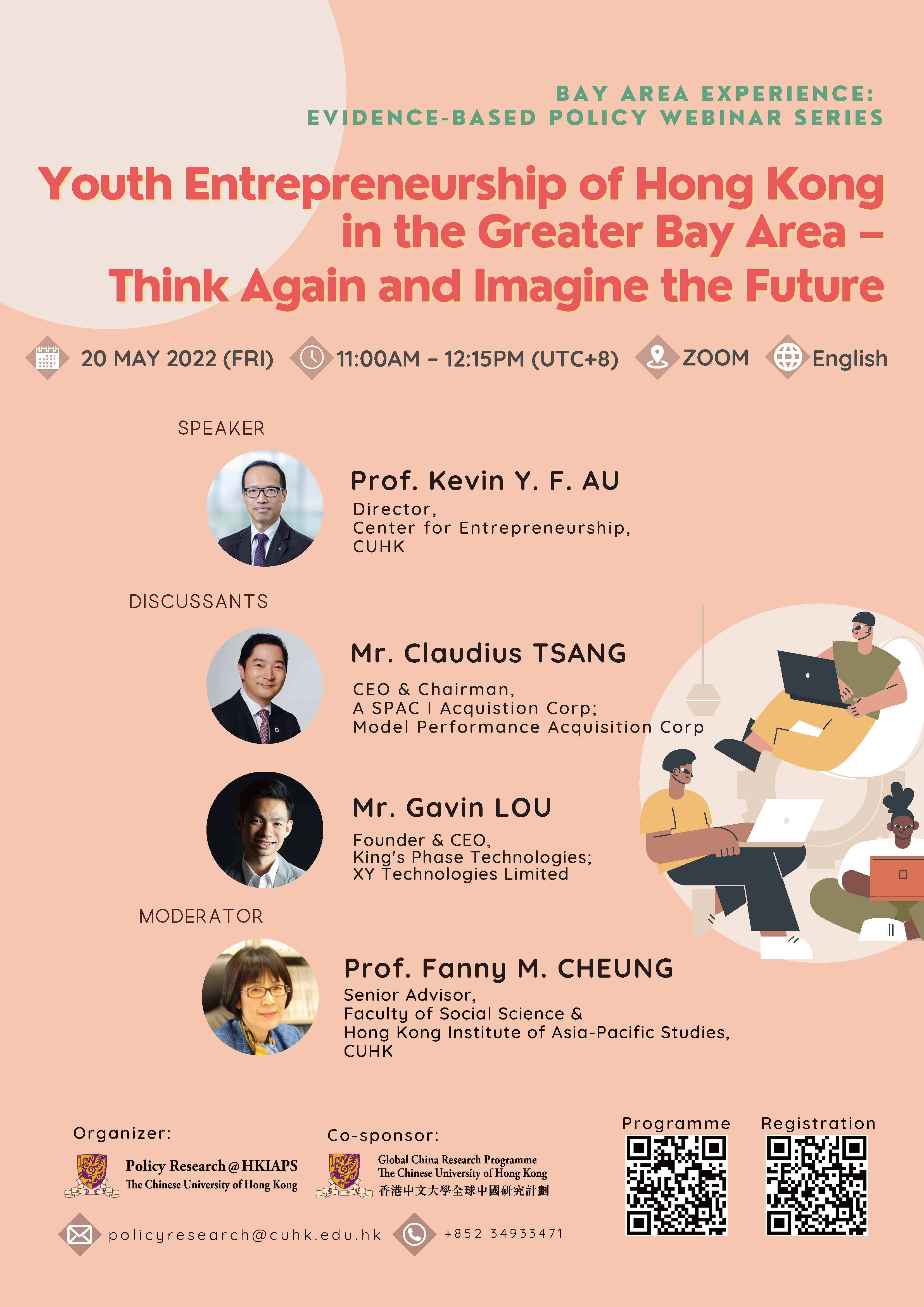
The speaker and discussants particularly addressed Shenzhen’s entrepreunship environment and compared it to New York City and Hong Kong.
Both cities have a great deal of resources and financing support, which helps the growth of new start-ups.
However, in Shenzhen, there is a lack of collaboration among stakeholders.
Many people in Hong Kong also were slow to embrace that China was rising when the new economic paradigm in Shenzhen unfolded.
Instead of “pushing” young people to try to start a business in the GBA solely by singing the praises of the GBA from a materialistic perspective,
a more appealing approach is to create opportunities for collaboration and attend to the identity and emotional needs of youngsters.
The speaker called for a paradigm shift in attitudes toward China’s development and young people’s expectations of their career development and life plans.
The younger generation should also “think again” to create their own identities and write their own stories given a possible future for them in GBA.
Prof. Au shared his thoughts on these issues and supplemented them with his recent experience in the “MAKE a DASH” programme,
which is aimed at supporting young entrepreneurs to develop businesses in the GBA.
Mr Tsang shared his observations on the differences in human resources and working attitudes between Hong Kong and mainland China.
He suggested that young entrepreneurs who aspire to start a business in the GBA should expect keen competition, especially in the field of technology.
Mr Lou shared his experiences with his start-up company. He pointed out that one reason the young generation hesitates to develop their career in the GBA relates to mobility barriers.
Start-ups come with tremendous responsibilities, and entrepreneurs should get ready to meet the challenges that they will encounter along the way.
Around 47 local and regional participants attended the webinar.
Webinar recap video 
|
|
|
|
|
|
Speakers
Prof. Hendrik Tieben
|
Director, School of Architecture, CUHK
|
|
Prof. Miodrag Mitrašinović
|
Professor of Architecture and Urbanism, Parsons School of Design,
The New School, United States
|
|
Moderator
Prof. Fanny M. Cheung
|
Senior Advisor, Faculty of Social Science & HKIAPS, CUHK
|
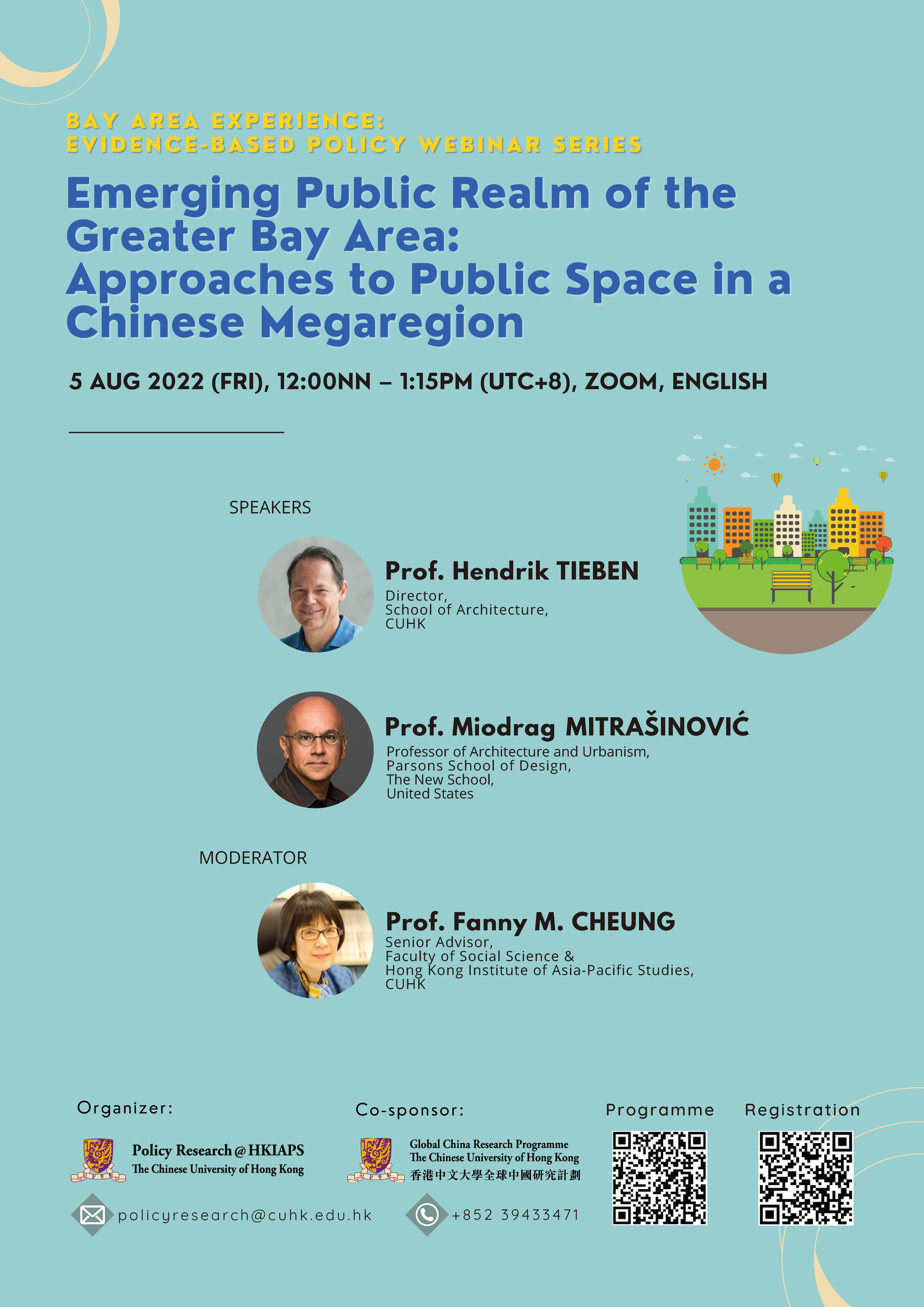
The two speakers, Prof. Hendrik Tieben and Prof. Miodrag Mitrašinović,
discussed recent trends in public space in the Greater Bay Area (GBA) that have emerged in the context of the region’s rapid urban development.
They also shared insights from public space studies gained during the pandemic.
Prof. Mitrašinović pointed out that public space is a significant and timely subject for scholars and professionals working in China today.
It has been an important catalyst for the emergence of the public realm in the GBA, which can be framed as a proper analytical unit.
In addition, public space must be studied and conceptualized across the differentiated scales and organized levels of the GBA megaregion.
He also believes that public space should be considered inseparable from other arenas in which “public” is simultaneously constituted.
He particularly addressed the circumstances under which the framework of public space can be viewed as a relevant and coherent analytical unit in the context of megaregionalism and vis-à-vis the emerging GBA megaregion.
On the one hand, the megaregionalism of the GBA is a national strategy focused on governance, economy, planning, and urban policy, and operationalized through production of the megaregional space.
On the other hand, GBA megaregionality is an ongoing process of producing megaregional geographies operationalized through production of the spaces in or of the megaregion.
These concepts contribute to understanding the everyday negotiation and struggle of ordinary people between common shared public spaces in the region.
Megaregional public space (tmps) is a catalyst for the realignment of governance, economic development, and infrastructure in the GBA.
The public spaces in the GBA megaregion (psmr) are a medium of resistance to the twin meta-narratives of globalization and urbanization,
but are also a vehicle for organizing the communitarian, social, and civic through an increasingly design-led tactical sub-regionalism.
Together, they configure what we call the emerging public realm of the GBA megaregion.
To complete the presentation, Prof. Tieben added his views on emerging approaches to public spaces in Hong Kong.
During the pandemic, many public space infrastructures limited their operations.
However, during this time communities and the HKSAR government presented new approaches to successfully improve public spaces in Hong Kong,
showing new forms of public space making and solid connections between citizens.
He also suggested areas relating to their usage that could be further explored,
such as the paradigm shift in urban development and how public spaces and cities in the GBA can further fire the imagination of people on the future of the GBA.
A total of 40 local and regional participants attended the webinar.
Webinar recap video 
|
|
|

